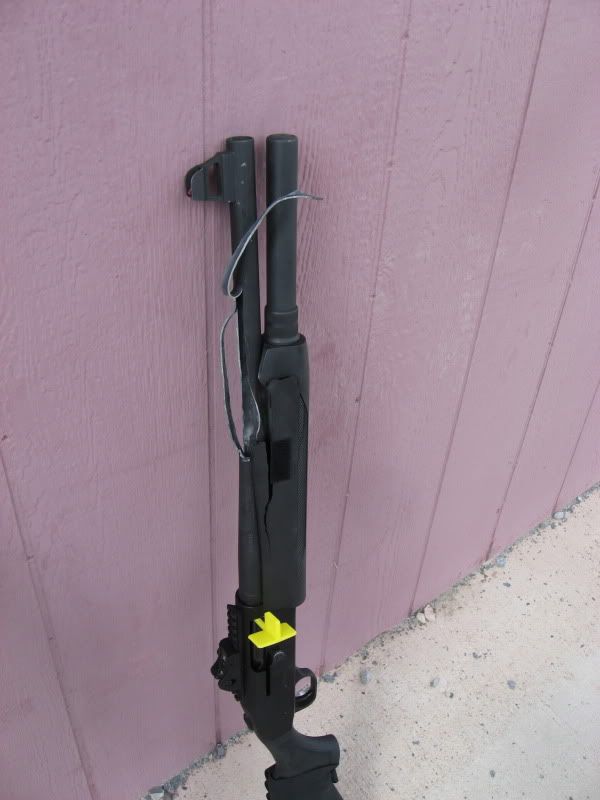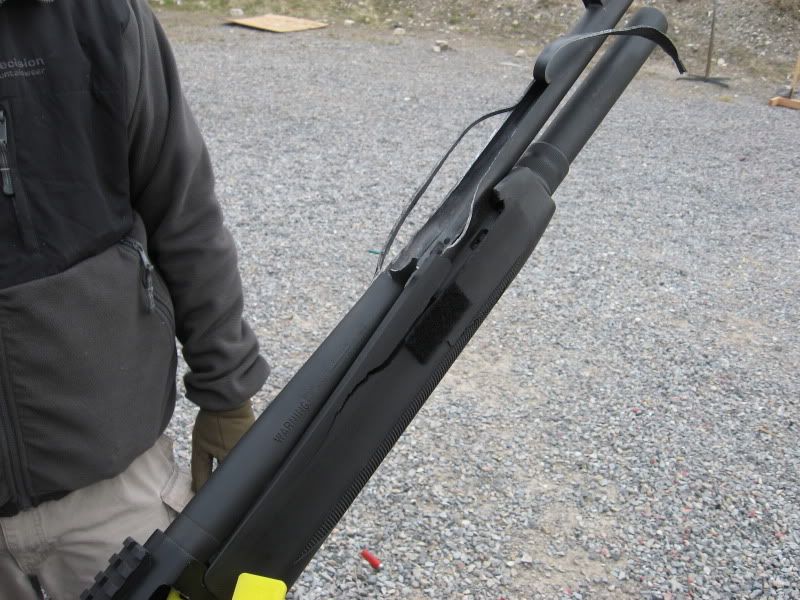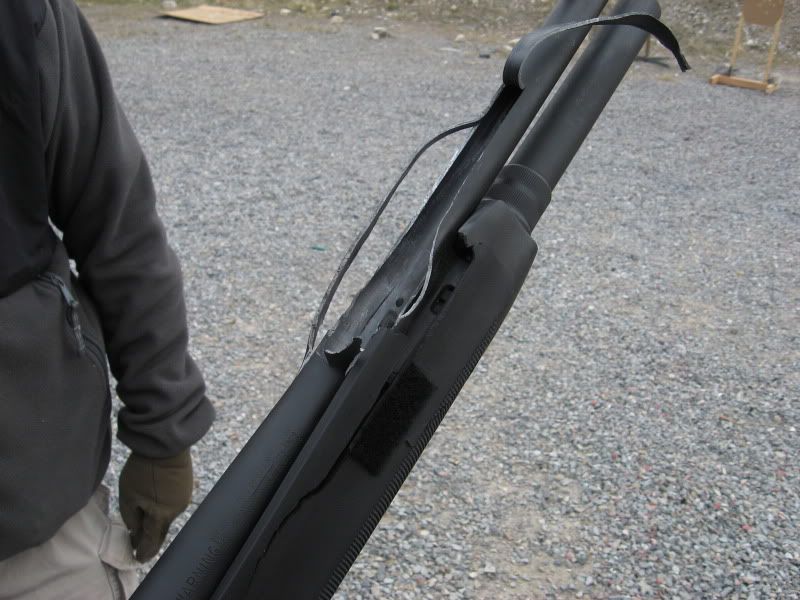I was acting as SO for a shooter in a stage of a 3-gun match yesterday. In the middle of the stage (after 8 or so rounds of birdshot) 2 slugs were required. The shooter loaded 2 Wolf slugs, attempted to fire, *click* (we all thought it was simply a dud)... he quickly performed a malfunction clearance, ejected the first and chambered the next slug, aimed, pulled the trigger, and BOOOOOM.
For a second the shooter didn't notice the burst barrel and was preparing to load up with birdshot and continue with the stage until I stopped him (I think he would have noticed something wrong once he brought the gun up and sighted down the barrel...) :shock:
First thing I said to him (after "stop! Stop!" and safety checking/chamber flagging the weapon--I suppose it could still fire, theoretically--and asking if he was hurt, which he wasn't... otherwise he probably would have noticed something was wrong :wink: ) was "is it possible you chambered a 20 gauge first by mistake?" It was kind of chaotic/confusing for a minute, as you can imagine.
It wasn't until afterward that we looked at the hulls on the ground and noticed they were both empty. Until that point we assumed he just ejected a dud cartridge as you normally would during a malfunction clearance. It all happened very quickly. One of the guys waiting to shoot said he thought it was strange that the "dud" that was ejected first was smoking on the ground, but he didn't really have time to think about it. It was just one of those things you only realize after it happens. And by the time he could have said anything the shooter had already pulled the trigger on the next round anyway.
The shooter had borrowed the shotgun from his brother, who wasn't very happy, understandably. Thankfully nobody was hurt. I was almost directly behind the shooter, a position which probably protected me from any schrapnel, which looks to have gone up and to the right from what we could guess.
From what we could tell the magazine tube wasn't damaged, but obviously the forend was destroyed. The owner says he's going to attempt to get compensated from Wolf (and there were many witnesses). It was a bit scary because we all just heard a "click" as the hammer fell, not a "pop" that would indicate an obvious squib. I suppose it's possible that a slow/late/incomplete powder burn occurred quietly just before he racked the bolt, and thus had just enough power to drive the slug into the barrel. Or maybe the round had very little or no powder and the primer's 'pop' was insulated by the barrel and the slug in front of it.
I've gone over this and over this in my head and tried to determine what we could have done better, and short of examining every *click* "dud" cartridge and examining the bore to ensure it's clear before the next shot is fired, which is obviously not the norm in a "competition" environment... I can't think of anything that would have prevented it in this specific case. If there had been an obvious "pop" of the primer we all would have stopped him, as has happened before (primers loaded backwards, etc.). But tactical/combat/competition malfunction drills emphasize clearing the dud/malfunction quickly and moving on.
In any case... in my private/informal shooting I'm going to take a good look at the bore and the shell after a "dud", before I load another round. Be careful out there, guys. Wear your eye protection. 8)
![Image]()
![Image]()
![Image]()
For a second the shooter didn't notice the burst barrel and was preparing to load up with birdshot and continue with the stage until I stopped him (I think he would have noticed something wrong once he brought the gun up and sighted down the barrel...) :shock:
First thing I said to him (after "stop! Stop!" and safety checking/chamber flagging the weapon--I suppose it could still fire, theoretically--and asking if he was hurt, which he wasn't... otherwise he probably would have noticed something was wrong :wink: ) was "is it possible you chambered a 20 gauge first by mistake?" It was kind of chaotic/confusing for a minute, as you can imagine.
It wasn't until afterward that we looked at the hulls on the ground and noticed they were both empty. Until that point we assumed he just ejected a dud cartridge as you normally would during a malfunction clearance. It all happened very quickly. One of the guys waiting to shoot said he thought it was strange that the "dud" that was ejected first was smoking on the ground, but he didn't really have time to think about it. It was just one of those things you only realize after it happens. And by the time he could have said anything the shooter had already pulled the trigger on the next round anyway.
The shooter had borrowed the shotgun from his brother, who wasn't very happy, understandably. Thankfully nobody was hurt. I was almost directly behind the shooter, a position which probably protected me from any schrapnel, which looks to have gone up and to the right from what we could guess.
From what we could tell the magazine tube wasn't damaged, but obviously the forend was destroyed. The owner says he's going to attempt to get compensated from Wolf (and there were many witnesses). It was a bit scary because we all just heard a "click" as the hammer fell, not a "pop" that would indicate an obvious squib. I suppose it's possible that a slow/late/incomplete powder burn occurred quietly just before he racked the bolt, and thus had just enough power to drive the slug into the barrel. Or maybe the round had very little or no powder and the primer's 'pop' was insulated by the barrel and the slug in front of it.
I've gone over this and over this in my head and tried to determine what we could have done better, and short of examining every *click* "dud" cartridge and examining the bore to ensure it's clear before the next shot is fired, which is obviously not the norm in a "competition" environment... I can't think of anything that would have prevented it in this specific case. If there had been an obvious "pop" of the primer we all would have stopped him, as has happened before (primers loaded backwards, etc.). But tactical/combat/competition malfunction drills emphasize clearing the dud/malfunction quickly and moving on.
In any case... in my private/informal shooting I'm going to take a good look at the bore and the shell after a "dud", before I load another round. Be careful out there, guys. Wear your eye protection. 8)








